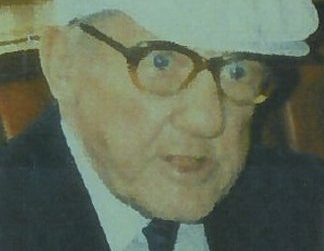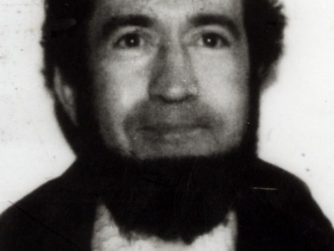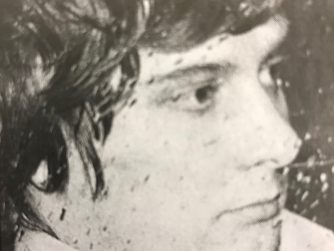“The attack on Daniel can only be described as despicable. At the time that his flat was set on fire he was still alive – he must have suffered a painful and extremely frightening death. Someone out there knows what happened and I don’t know how they can live with this well-liked man’s death on their conscience.” – Detective Superintendent Ian Foster (Senior Investigating Officer speaking in 2008)
If where you live has a local pub and you are a regular visitor there, the chances are that you will know a certain character in that pub. They are a staple of such establishments, and most have them- larger than life people, unique and perhaps known by a nickname. The former “Funny’s Bar”, on Chorley Old Road, Bolton was one of these such places to have one – Daniel Mcfadden, or “Brandy Dan” as he was known to his friends. “Funny’s Bar” has long gone today, knocked down and replaced with a small supermarket and different establishments. And “Brandy Dan” has gone too – gone because he was horrifically murdered one evening in June 1998.

Daniel Mcfadden was Irish born, hailing from a rural town in County Donegal where he was born in 1933. He had left Ireland at a young age and moved across the Irish Sea, settling in Glasgow for many years before moving down to Bolton in the mid 1980’s to be near his younger brother Charles and his family. Danny had never married and had very little family, only Charles and an elderly sister who still lived in Ireland. He had spent his entire working life as a labourer working in the construction industry, driving cranes up and down the country. But by 1998 Danny had long since retired and was living in a second floor council flat in the Mere Gardens district of Halliwell, Bolton.
Danny was a well known regular in many of Bolton’s pubs, and his usual practice was to visit a variety of them throughout the day, where he would find company and quiet reflection. He would spend part of the afternoon drinking, before returning home late in the afternoon and then going out again in the evening. By all accounts, he was a popular and well- liked man who didn’t seem to have any known enemies. On the day he died, June 17th 1998, Danny had left home at about 10:30am, and was seen about thirty minutes later sat on a bench in Newport Street in Bolton Town centre. He is believed to have visited several pubs around Bolton town centre that day, and police were able to confirm that that afternoon he was definitely seen in The Victory Arms and Funny’s Bar on Chorley Old Road. He is believed to have left Funny’s Bar alone, and returned to his flat at about 4:30pm that afternoon.
Danny is known to have returned to Funny’s Bar later on that evening, and was confirmed as being sat alone in there, enjoying his favourite tipple – a double brandy and half pint of bitter – at 10:20pm. He left after last orders that evening, and was seen near the Mornington Road/Chorley Old Road junction at about 11:30pm walking towards his home. Did he go straight home though? There was a possible but unconfirmed sighting of Danny outside the Morrisons supermarket at the bottom end of Chorley Old Road at 1:00am. If this was him, what was he doing?
If this was Danny, he must have returned home soon after this sighting and been murdered.
A neighbour who lived across from Danny’s council flat in Mere Gardens contacted the emergency services at about 3:30am after being woken by the sound of an explosion. Looking out of the window, he could see a blaze coming from Danny’s flat, and fire crews attended the scene, arriving at 3:37am. They doused the scene with water and when safe to do so, went in to investigate. The flat had been completely gutted,and when firefighters went into the bedroom, they discovered the body of Danny Mcfadden under a pile of furniture and clothing amongst the smouldering debris. The fire had built up until the windows exploded, and the subsequent rush of oxygen mixed with toxic fumes from the smouldering furnishings had caused an explosion. Danny hadn’t stood a chance.
The subsequent post mortem examination revealed that Danny had ultimately died as a result of inhaling smoke and toxic fumes caused by the fire – but a murder hunt began when the post mortem revealed that he also had a severely fractured skull, a fractured right cheek, and a broken jaw. He had been brutally battered, and three “D” shaped lacerations on his head led detectives to believe that the most likely weapon was a hammer. Following the assault, his killers had then placed a mattress, clothing and furnishings on top of the 5″8, 8 stone pensioner, who was still alive despite his injuries, and callously started the fire, leaving Danny to die a horrible, frightening death.
Detectives hunting the killer from the murder incident room at Castle Street police station in Bolton theorised that Danny had been followed home from the pub by his killer or killers. They had watched him go into his second floor flat, then waited to make their move. As no evidence of a forced entry was found, they suspected that Danny had either let his killer in or left the door ajar accidentally. Because the combination of the fire and its extinguishment had gutted the property, it was impossible to determine if it had been ransacked or if anything had been taken. House to house enquiries revealed very little – nobody had been seen entering or leaving the property, and the first anybody knew anything had happened was when the fire brigade were contacted following the explosion.
The crime struck fear and sadness into the close knit community where Danny had lived. Many of the people living in that area were pensioners themselves, and the thought that a brutal killer was walking the streets so familiar to them made them feel scared in their own homes. Danny’s next door neighbour, 59 year old Anne Haslam, summed up local feeling when interviewed by the Bolton Evening News shortly after the murder.
“I can’t take all this in. I just keep thinking over and over again about what happened on the other side of my wall. It’s a nightmare. I’ve got to get out because I can’t sleep and I won’t answer the door at night” – Anne Haslem (Danny’s next door neighbour).
Mrs Haslam had not seen or heard anything the night Danny was murdered, and was left so afraid that his killers may return that she was granted a move from the home she had lived in for eight years by a sympathetic Bolton Council.

Throughout the investigation, dozens of detectives worked thousands of man hours in an attempt to find Danny’s killer. More than 3,000 people were interviewed over the course of the investigation, and numerous lines of enquiry were followed, but ultimately detectives had very little to go on. The combination of the fire itself and the extinguishing of it had not only gutted the crime scene, but had also destroyed any potential forensic evidence that could have been obtained from Danny’s killers. A number of items were removed from the crime scene for forensic examination, but DNA testing at that time was not technologically advanced enough to produce any conclusive results. Nor has it to date been able to shed any new information as to the identity of Danny’s killers. No murder weapon has ever been found, and although eleven people were arrested in connection with Danny’s murder over the course of the investigation, no one has ever been charged with his murder.
What was the motive behind such a horrific crime? Detectives have never been able to confirm what the motive was, but local rumours abounded that Danny was believed to be a wealthy man, although his surviving family strongly denied this. There were tales of Danny having spoken about coming into a lot of money just before he died, relating to shares in a farm in Ireland that Danny and his sister had joint ownership of. But this was a falsehood – although Danny had had shares of a farm, the truth was that in the mid 1980’s Danny had had his share of the farm transferred into solely his sister’s name as he was unable to afford any payments relating to the upkeep of the farm. He had not made any money from the transfer, and actually had very little money. Did someone mistakenly believe that Danny had a substantial amount of money stashed at his home? It seems likely that this was the case. The crime was appealed on Crimewatch UK, and an anonymous caller spoke to one of the detectives in the studio, telling him:
“You do know he had hundreds of thousands of pounds stashed in his flat, don’t you?”
Detectives believe that Danny was deliberately targeted for this reason, and his killers had every intention of murdering him. But why the need to set a fire? At the inquest into Danny’s murder in 1999, Home Office pathologist Dr William Lawlor suggested that the fire was set deliberately to remove any traces of the killers from the scene. This seems likely, but the chilling possibility also exists that setting the fire was a sadistic act of inflicting pain and terror upon Danny, and was done with the intention of destroying and defiling him further.
It is very likely that someone today will know, or at least suspect, the identity of Danny’s killers. This is not a first time crime, as has been stated on various other cases covered on TTCE, this is a level of offending that is risen to, not started at. This is someone with a history of offending and likely an experienced burglar, with a history of violent offending or bullying and perhaps drug use. It is also likely that Danny was known to his killer(s), and vice versa. The killer(s), for it is likely that this was the work of more than one people, will therefore be local to the area. Mere Gardens is a haphazard housing estate built on a network of footpaths and an offender would likely strike in an area familiar to them to allow maximum potential for egress.
It is unlikely to have been a spur of the moment crime – for example a drunken argument between Danny and another person that someone has taken offence to and escalated. This would be a lot more heat of the moment, and I believe that a crime fuelled by any such motive would have taken place as Danny was making his way home on the street and would have been witnessed. There is no suggestion that Danny was involved in anything untoward or illicit, indeed, people who knew him testified as to his gentle and kind nature, and how he was “a perfect gentleman”, always ready to buy someone a drink. So this likely rules out a revenge or grudge attack, and this possibility would have been ruled out early on in the investigation.
It is more likely that robbery was the motive here, and that there is some truth to the notion that Danny’s killers believed him to have a substantial sum of money in the house. The killers came armed and is likely that they always intended to murder Danny – an eight stone pensioner would not put up much resistance to one or more intruders. A possible reason for the decision to kill him is that the killers were known well to him – perhaps regulars from one of the pubs that he frequented – and by leaving him alive, he would have been able to identify them. I believe strongly that the fire was set to remove any forensic evidence from the scene – perhaps the killer or killers left fingerprints during the assault, or perhaps one of them was injured during it and left bloodstains. Remove the scene, remove the evidence.
It is likely that police spoke to Danny’s killer or killers during the course of the investigation. It seems that a person capable of such violence and brutality as was used here would stand out, and as mentioned, police made eleven arrests over the course of investigating Danny’s murder but no one was ever charged. I believe that a prime suspect, very likely the killer, would have been amongst this eleven, but escaped justice due to a lack of conclusive evidence to bring a murder charge. The case has never been closed and has been re-appealed numerous times over the years, but to no avail. However, over passage of time loyalties people once had may change, or people may overcome a fear of retribution that they had that prevented them from coming forward at the time, and may provide police with evidence that helps bring Danny’s killer to justice. Until that time, his remaining family are left questioning the senselessness of such a cowardly, despicable crime, and await “Brandy Dan” getting the justice that he deserves.
“You can understand the fire – they were probably trying to burn the evidence. You can understand that, but why do it in the first place? Danny never said an angry word in his life. He probably expected to live to old age but that didn’t happen. Somebody saw to that.” – Charles Mcfadden
Anyone with information concerning Danny’s murder is asked to call the Major Incident Team on 0161 856 5860 or Crimestoppers, anonymously, on 0800 555 111.
The True Crime Enthusiast



